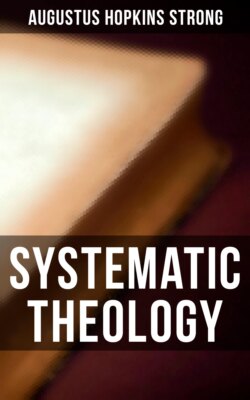Читать книгу Systematic Theology - Augustus Hopkins Strong - Страница 18
На сайте Литреса книга снята с продажи.
3. Essential Idea.
ОглавлениеReligion in its essential idea is a life in God, a life lived in recognition of God, in communion with God, and under control of the indwelling Spirit of God. Since it is a life, it cannot be described as consisting solely in the exercise of any one of the powers of intellect, affection, or will. As physical life involves the unity and coöperation of all the organs of the body, so religion, or spiritual life, involves the united working of all the powers of the soul. To feeling, however, we must assign the logical priority, since holy affection toward God, imparted in regeneration, is the condition of truly knowing God and of truly serving him.
See Godet, on the Ultimate Design of Man—“God in man, and man in God”—in Princeton Rev., Nov. 1880; Pfleiderer, Die Religion, 5–79, and Religionsphilosophie, 255—Religion is “Sache des ganzen Geisteslebens”: Crane, Religion of To-morrow, 4—“Religion is the personal influence of the immanent God”; Sterrett, Reason and Authority in Religion, 31, 32—“Religion is the reciprocal relation or communion of God and man, involving (1) revelation, (2) faith”; Dr. J. W. A. Stewart: “Religion is fellowship with God”; Pascal: “Piety is God sensible to the heart”; Ritschl, Justif. and Reconcil., 13—“Christianity is an ellipse with two foci—Christ as Redeemer and Christ as King, Christ for us and Christ in us, redemption and morality, religion and ethics”; Kaftan, Dogmatik, 8—“The Christian religion is (1) the kingdom of God as a goal above the world, to be attained by moral development here, and (2) reconciliation with God permitting attainment of this goal in spite of our sins. Christian theology once grounded itself in man's natural knowledge of God; we now start with religion, i.e., that Christian knowledge of God which we call faith.”
Herbert Spencer: “Religion is an a priori theory of the universe”; Romanes, Thoughts on Religion, 43, adds: “which assumes intelligent personality as the originating cause of the universe, science dealing with the How, the phenomenal process, religion dealing with the Who, the intelligent Personality who works through the process.” Holland, in Lux Mundi, 27—“Natural life is the life in God which has not yet arrived at this recognition”—the recognition of the fact that God is in all things—“it is not yet, as such, religious; … Religion is the discovery, by the son, of a Father who is in all his works, yet is distinct from them all.” Dewey, Psychology, 283—“Feeling finds its absolutely universal expression in religious emotion, which is the finding or realization of self in a completely realized personality which unites in itself truth, or the complete unity of the relations of all objects, beauty or the complete unity of all ideal values, and rightness or the complete unity of all persons. The emotion which accompanies the religious life is that which accompanies the complete activity of ourselves; the self is realized and finds its true life in God.” Upton, Hibbert Lectures, 262—“Ethics is simply the growing insight into, and the effort to actualize in society, the sense of fundamental kinship and identity of substance in all men; while religion is the emotion and the devotion which attend the realization in our self-consciousness of an inmost spiritual relationship arising out of that unity of substance which constitutes man the true son of the eternal Father.” See Van Oosterzee, Dogmatics, 81–85; Julius Müller, Doct. Sin, 2:227; Nitzsch, Syst. of Christ. Doct., 10–28; Luthardt, Fund. Truths, 147; Twesten, Dogmatik, 1:12.
